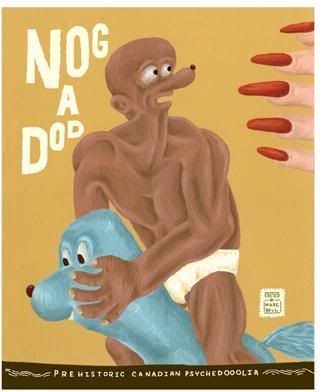Lil' Post
Nog a Dod
(this review first appeared in The Comics Journal #279, Nov. 2006; as usual, the formatting is slightly different here)

The back cover of this chunky little tome helpfully describes its contents as “Somewhere between comics, psychedelic notebook doodles and fine art.” That’s about as good as I could do, even though it leaves out the poetry and restaurant reviews also found therein. Certainly one shouldn’t get their hopes up over the prospect of page upon page of briskly surreal, winsomely molded comics storytelling, the type that editor Marc Bell has become noted for; more often the book is given over to the pleasures of simple drawing and composition, a plethora of artists filling their pages (and one another’s) as if compelled by curious forces to create till blood spills from underneath their fingernails, and then create more with that.
Nog a Dod acts as a chronicle of a decade of so (1995-2005) of work by an extended klatch of Canadian artists, arranged so that little chronological mapping of the work is possible without taking notes; it’s thus demanded of us that we appreciate the work in terms of interrelated aesthetic, with editor Bell often deliberately stacking works that may or may not seem akin to one another. This makes sense, as several of these artists -- Bell, Peter Thompson (of The Chronicles of Lucky Ello), Jason McClean -- sometimes literally remake or draw atop one another’s work, or slice up prior works to paste them together into new pieces. Bell offers intermittent commentary to keep things semi-cohesive, but he’s fighting an uphill battle; his introduction confesses that he could fill a whole second book with stuff he left out, and you’ll probably feel a supplement is necessary just to have a fuller grasp of the scene.
Ah, but it’s quite a scene at times. As intermittent as the book can be in its showcase, you’ll probably fall in love with something, whether it’s Scott Evan’s color-drenched photography, Tommy Lacroix’s beautifully itchy puzzle piece collages, or the gorgeously rounded Woodringesque iconic mindscapes of Owen Plummer. It’s bound to be frustrating, as you’ll only want more of what you liked, but there’s something to be said of cumulative effect - by the time you hit the hundredth indexed cover to some minicomic or tiny project you’ve not heard of, the book seems like some sprawling price-stripped catalog to an alternate dimension’s pamphlet industry, and the shock of realizing the world isn’t so small after all might be this thing’s best trick.
(this review first appeared in The Comics Journal #279, Nov. 2006; as usual, the formatting is slightly different here)

The back cover of this chunky little tome helpfully describes its contents as “Somewhere between comics, psychedelic notebook doodles and fine art.” That’s about as good as I could do, even though it leaves out the poetry and restaurant reviews also found therein. Certainly one shouldn’t get their hopes up over the prospect of page upon page of briskly surreal, winsomely molded comics storytelling, the type that editor Marc Bell has become noted for; more often the book is given over to the pleasures of simple drawing and composition, a plethora of artists filling their pages (and one another’s) as if compelled by curious forces to create till blood spills from underneath their fingernails, and then create more with that.
Nog a Dod acts as a chronicle of a decade of so (1995-2005) of work by an extended klatch of Canadian artists, arranged so that little chronological mapping of the work is possible without taking notes; it’s thus demanded of us that we appreciate the work in terms of interrelated aesthetic, with editor Bell often deliberately stacking works that may or may not seem akin to one another. This makes sense, as several of these artists -- Bell, Peter Thompson (of The Chronicles of Lucky Ello), Jason McClean -- sometimes literally remake or draw atop one another’s work, or slice up prior works to paste them together into new pieces. Bell offers intermittent commentary to keep things semi-cohesive, but he’s fighting an uphill battle; his introduction confesses that he could fill a whole second book with stuff he left out, and you’ll probably feel a supplement is necessary just to have a fuller grasp of the scene.
Ah, but it’s quite a scene at times. As intermittent as the book can be in its showcase, you’ll probably fall in love with something, whether it’s Scott Evan’s color-drenched photography, Tommy Lacroix’s beautifully itchy puzzle piece collages, or the gorgeously rounded Woodringesque iconic mindscapes of Owen Plummer. It’s bound to be frustrating, as you’ll only want more of what you liked, but there’s something to be said of cumulative effect - by the time you hit the hundredth indexed cover to some minicomic or tiny project you’ve not heard of, the book seems like some sprawling price-stripped catalog to an alternate dimension’s pamphlet industry, and the shock of realizing the world isn’t so small after all might be this thing’s best trick.

<< Home